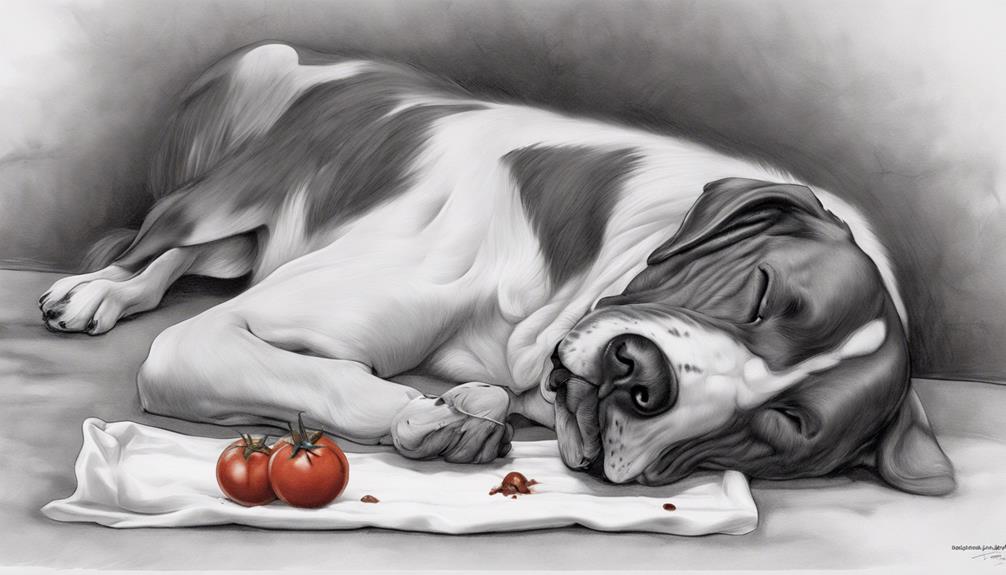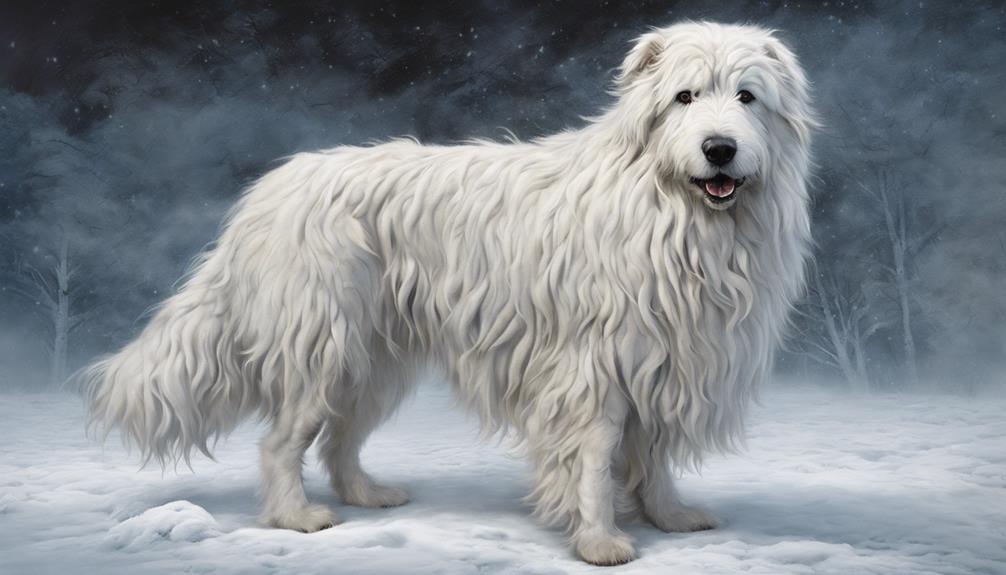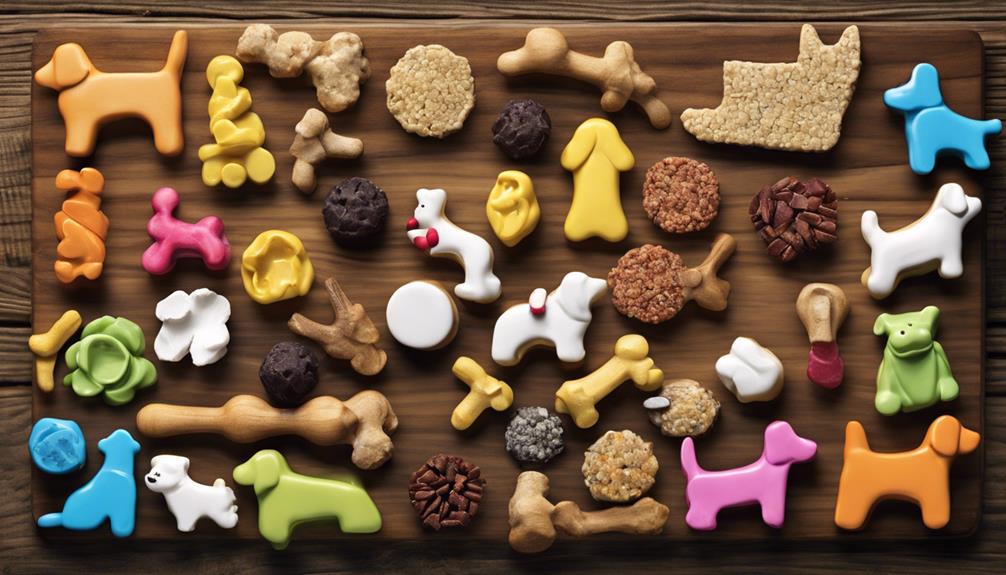Yes, dogs can consume chestnuts, but precautions are crucial. Chestnuts provide nutrients like fiber and vitamins B6 and C, but raw chestnuts are hazardous due to toxins. Risks include digestive upset and choking hazards. To feed safely, remove shells and skins, and opt for roasted, unsalted nuts. Chop or mash for easier eating and avoid candied versions. Moderation is key for a well-rounded diet. For more details on the benefits and risks of feeding chestnuts to dogs, explore the detailed information provided, ensuring your furry friend's safety and health.
Key Takeaways
- Chestnuts are safe when roasted and served without harmful seasonings.
- Remove shells and inner skin before feeding to avoid choking hazards.
- Toxicity in raw chestnuts can cause digestive upset and health risks.
- Moderation is crucial to prevent gastrointestinal issues in dogs.
- Avoid candied, salted, or chocolate-covered chestnuts as they are toxic to dogs.
Health Benefits of Chestnuts for Dogs
Chestnuts offer valuable health benefits to dogs, supporting their immune system and overall well-being with essential nutrients like fiber and vitamins. Dogs benefit from the rich fiber content in chestnuts, aiding in digestion and contributing to weight management. Additionally, the vitamins B6 and C found in chestnuts play an essential role in boosting a dog's immune system, keeping them healthy and strong. Minerals such as manganese and copper, present in chestnuts, are necessary for maintaining a dog's skin and coat health, promoting a shiny and lustrous appearance.
Moreover, the antioxidants in chestnuts provide extra health perks for dogs, helping to ward off illnesses and contributing to their overall well-being. When incorporated into a balanced diet in moderation, chestnuts can be a nutritious addition for dogs, offering a range of benefits that support their health and vitality. Remember, a varied diet is key to ensuring that your furry companion receives all the necessary nutrients for a happy and healthy life.
Risks of Dogs Eating Chestnuts
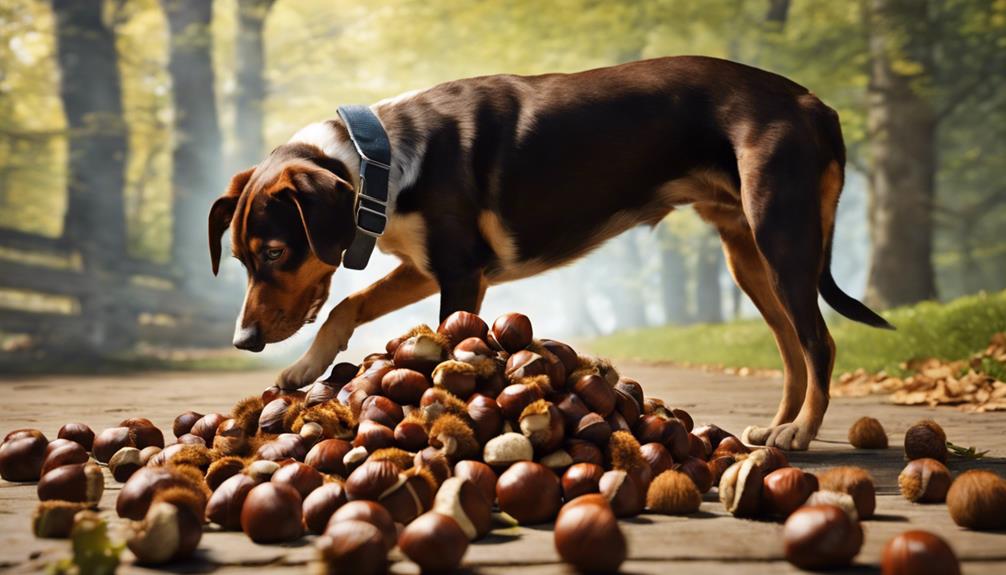
Eating chestnuts can pose potential risks to dogs, particularly due to their high carbohydrate content. While dogs can eat chestnuts, it's important to be cautious.
The high carbohydrate levels in chestnuts can lead to gastrointestinal upset in dogs, causing symptoms like vomiting and diarrhea. Additionally, if chestnuts aren't chopped into small, manageable pieces, dogs may be at risk of choking, making it vital to make sure they're well-prepared before feeding them to your furry friend.
Furthermore, some dogs may have allergic reactions to chestnuts, so it's crucial to monitor them closely after consumption. Bear in mind that pancreatitis is also a concern when it comes to feeding chestnuts to dogs, so watch out for any signs of this condition.
To keep your dog safe, avoid giving them candied, salted, or chocolate-covered chestnuts, as these can be toxic to dogs. Prioritize your dog's well-being by being informed and careful when considering adding chestnuts to their diet.
Can Dogs Eat Raw Chestnuts?

After discussing the risks of dogs consuming chestnuts, it becomes evident that the safety of feeding raw chestnuts to dogs is a critical concern. Raw chestnuts, whether sweet or horse chestnuts, contain toxins that can be harmful to dogs. These toxins not only pose a risk of digestive upset but can also lead to serious health problems.
Additionally, the shape and size of raw chestnuts can be a choking hazard for dogs, further emphasizing the importance of avoiding them in a dog's diet. It's strongly recommended to steer clear of feeding raw chestnuts to dogs to prevent potential complications and maintain their well-being. Opting for safer alternatives is the best course of action when considering treats for your furry friend.
Proper Ways to Feed Chestnuts to Dogs

When including chestnuts in a dog's diet, it's crucial to properly prepare them by removing the outer shell and inner skin. Roasted chestnuts are a secure option for dogs, but make sure to avoid any seasoning that could be harmful to your furry friend.
Chopping or mashing the chestnuts into smaller pieces can help with easier consumption and digestion. Bear in mind to keep your dog away from the outer layer and shells of the chestnuts, as they can pose a choking hazard and lead to gastrointestinal issues.
Moderation is key when feeding chestnuts to dogs to prevent any potential negative effects on their health. By following these simple guidelines, you can safely introduce chestnuts into your dog's diet as an occasional treat. Guarantee your pet's well-being by always considering their safety and health when offering new foods.
Chestnuts: A Safe Dog Treat Option
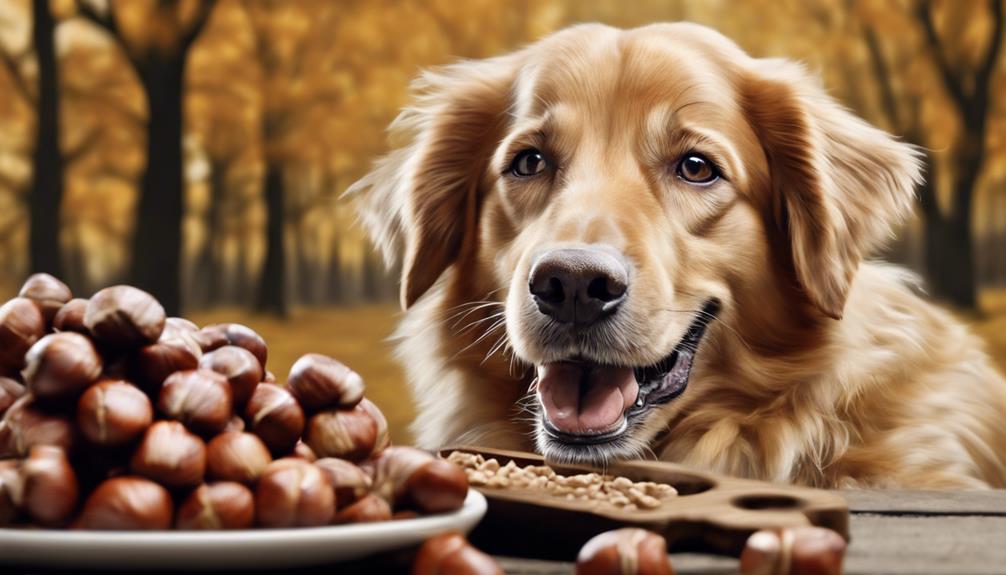
For dog owners looking for a nutritious and safe treat option, sweet chestnuts can be a beneficial addition to their pet's diet. Sweet chestnuts are known for being low in fat, high in fiber, and packed with essential vitamins and minerals that can contribute to your dog's overall health. When offering chestnuts to your furry friend, it's important to chop or mash them into small pieces to make it easier for them to consume. Remember to avoid feeding your dog chestnut shells, as they can be a choking hazard and may lead to gastrointestinal issues.
There are different types of chestnuts available, with sweet chestnuts being the safest for dogs to eat. Another type of chestnut, known as conkers, should be avoided as they can be toxic to pets. Moderation is key when incorporating chestnuts into your dog's diet to prevent any potential digestive upset. By following these guidelines, you can safely introduce chestnuts as a tasty and nutritious treat option for your beloved canine companion.
Frequently Asked Questions
Are Chestnuts Toxic for Dogs?
Yes, chestnuts are toxic for dogs. Ingesting them can lead to serious health issues, requiring immediate veterinary attention. Aesculin in chestnuts can be fatal if not treated promptly after ingestion by dogs.
Raw chestnuts, including their shells, aren't recommended for canine consumption due to potential hazards. To prevent digestive upset and health problems, it's best to avoid feeding any type of chestnut, especially raw ones, to dogs.
Why Do Dogs Like Chestnut?
We like chestnuts because of their sweet taste, appealing texture, and enticing aroma. These factors make them enjoyable to chew and explore during foraging activities.
The crunchiness of chestnuts provides a satisfying chewing experience that dogs find irresistible. These natural instincts drive their interest in this seasonal treat.
Do Animals Eat Raw Chestnuts?
Raw chestnuts contain toxins harmful to dogs. Feeding them can lead to digestive upset and health issues. It's best to avoid giving dogs raw chestnuts to prevent adverse reactions.
If a dog accidentally ingests them, consult a veterinarian for guidance and care. Remember, chestnuts can pose a choking hazard due to their shape and size.
Keep your furry friends safe and stick to dog-friendly treats.
Are Raw Chestnuts Safe to Eat?
Raw chestnuts aren't safe for consumption. They contain toxins harmful to dogs, leading to potential poisoning and digestive issues.
It's important to avoid feeding raw chestnuts to dogs to prevent health risks. Stick to safe treats like dog-friendly fruits and vegetables.
Conclusion
To sum up, while chestnuts can offer health benefits to dogs when fed in moderation, there are risks to take into account such as choking hazards and digestive issues.
It's important to always cook chestnuts before feeding them to your furry friend and to remove the shells to prevent any potential harm.
Remember the old adage, 'An ounce of prevention is worth a pound of cure,' and make sure to consult with your veterinarian before introducing any new foods into your dog's diet.
Stay informed and keep your pup safe!


